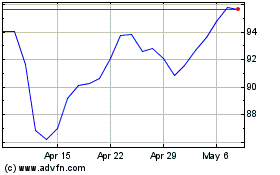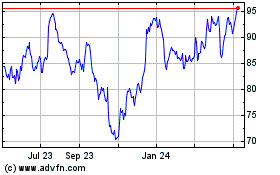New Retirement Rules Don't Pose Hurdle for Morgan Stanley's Brokerage
April 19 2017 - 12:25PM
Dow Jones News
By Michael Wursthorn
Morgan Stanley isn't sweating retirement rules set to take
effect in June.
The New York bank played down the effects of the U.S. Labor
Department's fiduciary rule, which requires brokers to put the
interests of retirement savers ahead of their own, as it was
delayed earlier this month after the Trump administration ordered
an economic-impact review that may result in it being revised or
rescinded.
The bank said that while the rule has had a chilling effect on
recruiting, broker attrition has been low and the brokerage has
been better able to retain and find talent.
"It's all been positive from that perspective," Jonathan Pruzan,
Morgan Stanley's chief financial officer, said Wednesday while
discussing first-quarter results with analysts. "We're prepared if
it does go into effect."
Wall Street's biggest banks have either been mum on the
fiduciary rule during this earnings season or, such as Morgan
Stanley, said it hasn't had a detrimental impact on their
businesses.
Then there is Merrill Lynch, which showed it is already
capitalizing on changes it made to comply with the rule,
specifically moving most of its retirement-saving clients who pay
commissions to accounts that charge a fee based on a percentage of
the assets. The Bank of America Corp. brokerage unit says fee-based
accounts are better suited to minimize risks, but they also shield
the firm from the rule's more onerous requirements.
Mr. Pruzan reiterated Wednesday that Morgan Stanley will
continue to offer commissions as a payment option to retirement
savers. Executives at the firm, however, have said such accounts
would likely carry some sales restrictions, such as around
annuities, because of the rule's restrictions on compensation
incentives.
Still, Morgan Stanley, like Merrill and others, continue to
collect billions of dollars in new fee-based assets, boosting the
wealth-management unit's revenue.
In the first quarter, Morgan Stanley's wealth unit reported
$4.06 billion in revenue, up 11% from the year-earlier period, on
higher asset-based fees and commissions. Net income for the unit
rose 31% from last year, to $647 million. The unit's pretax profit
margin, a key performance metric, rose 3 percentage points from
last year, to 24%.
Morgan Stanley collected $18.8 billion in new fee-based assets
through the first three months of the year, pushing its stockpile
to a record $927 billion. Of the unit's $2.2 trillion in client
assets, about 42% reside in fee-based accounts, up from 40% a
year-earlier.
"We've had good momentum," Mr. Pruzan told analysts, adding that
the shift toward collecting more fees away from commissions
continues.
More broadly, Morgan Stanley beat Wall Street estimates after
reporting a profit of $1.93 billion on revenue of $9.75
billion.
Write to Michael Wursthorn at Michael.Wursthorn@wsj.com
(END) Dow Jones Newswires
April 19, 2017 12:10 ET (16:10 GMT)
Copyright (c) 2017 Dow Jones & Company, Inc.
Morgan Stanley (NYSE:MS)
Historical Stock Chart
From Mar 2024 to Apr 2024

Morgan Stanley (NYSE:MS)
Historical Stock Chart
From Apr 2023 to Apr 2024
